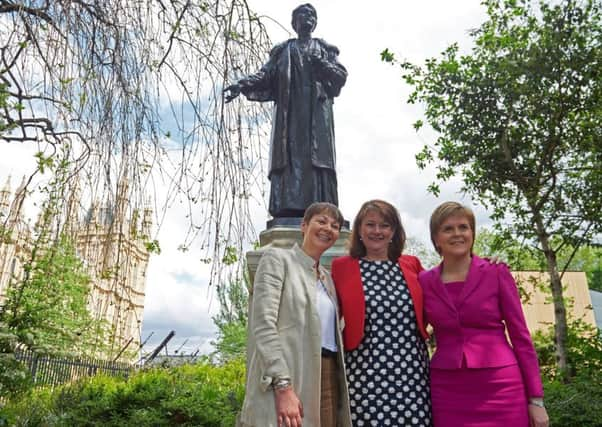Ruth Davidson: Women must seize power after sexual harassment scandal


The sexual harassment and scandals of recent weeks have rightly placed attention on the procedures and practices of political parties and parliaments. There can simply be no toleration of bullying in politics and it is incumbent on the authorities to ensure people feel safe and protected in the workplace.
But, as necessary and overdue as these reforms are, they will fail – on their own – to change make the proper change in culture our politics needs. That can only happen with a longer term realignment and requires, among other measures, more women to take their place in the political workplace.
Advertisement
Hide AdAdvertisement
Hide AdThat might sound odd when, wherever you look – from Number 10 to Bute House – women are in the top political jobs like never before.
A prime minister, two first ministers, plus the leaderships of Plaid Cymru, the Welsh Lib Dems, the Scottish Conservatives, Sinn Fein and the Alliance Party in Northern Ireland, along with co-convenorships of the UK and Scottish Green parties seems like not a bad haul.
And, in the course of researching a book on women who’ve broken the glass ceiling, I’ve also had the chance to speak to strong female leaders who are reaching the top in roles dominated by men: women like the political editor Laura Kuenssberg, the Hollywood actor, Maria Bello and former moderator, the Very Reverend Dr Lorna Hood.
It’s true that, proportionally, more women are reaching the top than ever before. That applies to politics, business and all other walks of life.
But it is nowhere near enough.
In politics, it is worth thinking about what democracy actually is. At base, it’s about groups of people selecting one of their number to speak for them all, and to decide the law on their behalf.
So if politics is about representation, surely parliaments should look and sound a bit more like the countries that they represent? With women constituting more than half the population, it seems anomalous that they constitute just 32 per cent of the House of Commons and 35 per cent of Holyrood.
Drill down to local authority level, and it’s even more pronounced – almost a third of councillors in England are women, but for Scotland, Northern Ireland and Wales that drops to around a quarter.
It’s not that women care less about the world around them – quite the opposite. But there is still an issue regarding the number of women seeking to stand at elections and the resolve of political parties to support and encourage their applications.
Advertisement
Hide AdAdvertisement
Hide AdIn truth, my party is behind the curve. With a third of MPs and MSPs being women, Conservatives contribute just a quarter of their number to that total.
While this may constitute a significant improvement (in 2010 fewer than a sixth of Conservative MPs were women) it shows how far we have still to go.
The sexual harassment scandal has shown we must press ahead with urgency to reform the system.
I want to do my part. In 2005, the Prime Minister helped set up a new organisation called Women2Win to identify, recruit, assess, support and mentor female candidates. Crucially, the group is focused on funding women winnable seats – so they are not just there to make up the numbers.
Last year, the Scottish Conservatives adopted the same model in a bid to encourage a new generation of women to stand for public office.
There are plenty of capable women in the Scottish Conservatives, many holding national positions or running associations. My frustration is seeing these women – or women like them who are passionate about politics - shrink from putting their name on a ballot paper.
Much of the current aggressive, adversarial nature of modern politics puts them off. A number of the women I speak to would prefer a job that’s focused on solutions rather than on differences.
So Women2Win is designed to provide a supportive community of experienced women who can answer the questions and sometimes, concerns, of women seeking a career in politics.
Advertisement
Hide AdAdvertisement
Hide AdIt doesn’t focus on targets, or quotas, or short-term fixes.
Rather, Women2Win focuses on the long term solutions to the problem of helping women enter and prosper in politics. It asks women, individually, to get involved.
It gives them training, and supports them to apply for seats. It provides mentors who’ve been through it all before and can reassure those nervous about what elected politics can hold.
And it works. Cabinet-level alumni include Home Secretary Amber Rudd, Education Secretary Justine Greening and Culture Secretary Karen Bradley.
When Shadow Chancellor, Ed Balls, dramatically lost his seat in 2015, it was to Andrea Jenkyns, mentored and supported by Women2Win.
So I very much hope that one legacy from the toxic headlines of the last few weeks is an increase in female participation.
I hope there are women out there whose reaction to the revelations from both Holyrood and Westminster isn’t to be turned off politics, but to decide they are the ones to change it.
Gambling it all and leaving journalism for politics – knowing that if I failed, I would never be able to return to my former career – is still the best decision I ever made. As old fashioned as it sounds, politics is still a public service and it is challenging, frustrating, joyous, engaging, stressful, depressing and uplifting in equal measure.
It needs good people to step forward.
Advertisement
Hide AdAdvertisement
Hide AdPolitics also needs a range of backgrounds, qualities and life experiences to be truly representative.
That’s why we need to redouble our efforts to ensure more women come through – to all political parties.
A more balanced politics will see a more balanced culture, one where sexual harassment and bullying are challenged, not wished away.
Ruth Davidson will be writing a regular fortnightly column for The Scotsman